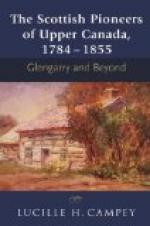At last they saw three musk oxen grazing by the side of a small lake. This seemed a splendid piece of fortune, but, to their mortification, before they could get one of them skinned, a tremendous downpour of rain ensued, so as to make it out of their power to have a fire, for their only form of fuel was moss. And the flesh of the musk ox eaten raw was disgusting; it was coarse and tough, and tasted so strongly of musk that Hearne could hardly swallow it. “None of our natural wants,” he writes, “except thirst, are so distressing or hard to endure as hunger.... For want of action, the stomach so far loses its digestive powers that, after long fasting, it resumes its office with pain and reluctance.” After these prolonged fasts, his stomach was scarcely able to contain two or three ounces of food without producing the most agonizing pain. “We fasted many times two whole days and nights, and twice for three days; once for nearly seven days, during which we tasted not a mouthful of anything, except a few cranberries, water, scraps of old leather, and burnt bones.”
At a place 63 deg. north latitude he bought a canoe for a single knife “the full value of which did not exceed one penny”, having been told that they would soon reach rivers through which they could not wade. And, moreover, they found an Indian who was willing to carry it. In July his guide persuaded him to join an encampment of natives—about six hundred persons living in seventy tents—asserting that, as it was no use proceeding much farther north in their search for the Coppermine River that season, it would be well to winter to the west, and resume their northern journey in the spring. The country, though quite devoid of trees, and mostly barren rock, was covered with a herb or shrub called by the Indian name of Wishakapakka,[2] from which the European servants of the Hudson’s Bay Company had long been used to prepare a kind of tea by steeping it in boiling water. Here there were multitudes of reindeer feeding on the Cladina lichen and the Indians with Hearne killed large numbers for the food of the party, and also for their skins and the marrow in their bones.
[Footnote 2: This word is said to be a corruption or altered form of Wishakagami[-u], a liquid or broth (Kri language). The drink made from this shrub or herb (Ledum palustre) is now known as Labrador tea. It is a bitter aromatic infusion.]




